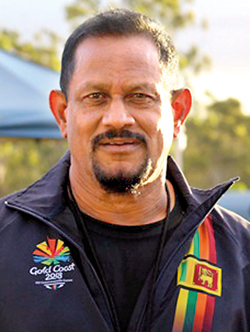Sri Lanka athletics need a national policy – Sunil Gunawardena
 A veteran athletics coach Sunil Gunawardena laments the absence of a proper national policy to take Sri Lanka athletic to the next level, despite there’s talent in abundance in the country.
A veteran athletics coach Sunil Gunawardena laments the absence of a proper national policy to take Sri Lanka athletic to the next level, despite there’s talent in abundance in the country.
Gunwardena–the mastermind behind country’s athletics transformation in the late 90′s where Sri Lanka produced number of top class athletes in Susanthika Jayasinghe, Damayanthi Darsha, Sugath Thilakeratne and Sriyani Kulawansa says all what Sri Lanka now need is a proper four-year plan to produce champions.
“During my 50-year career as an athlete and an official, last year was exceptional, as the country found the best-ever bunch of talented Junior Athletes,” said Gunawardena–a former Asian Games gold medalist.
“If we take care of them and nurture them for 4 years, we can dominate at the Asian Games, Commonwealth Games, IAAF Championships and, why not, the Olympics,” the 70-year-old Gunawardena said.
In the 1990s, the Sports Minister’s main advisor was Gunawardena. With the ideas and national policy he introduced, Sri Lanka excelled, winning Asian Games Gold medals regularly in sprint events with records. As a result of the programme in place and the untiring effort of the athletes, Sri Lanka produced two World Championships medals and an Olympic silver through country’s most celebrated sprinter Susanthika Jayasinghe. The records Sri Lanka broke at Asian level still remain unbroken.
“We found a very good bunch of young sprinters, high jumpers, long jumpers, and relay teams in junior level with a few seniors as well, so, I think we can easily groom them to the next level only if we have a proper national plan,” Gunawardena explained.
“These young athletes are mostly from outstations. So we must bring them to Colombo, get them into good schools in Colombo and must look after them providing them with transport, food and accommodation. This was what we did in the 90′s–ease their burden allowing them to concentrate on athletics. This did wonders for us”.
Gunawardena was also highly critical of the local coaches who wants to win at any cost rather than developing athletes gradually to reach the top.
“This is why we don’t perform well at the highest level anymore. We kill them at the very tender age by introducing them to performance enhancing drugs. Most of these athletes are like ‘broiler chicken’ — fast growth but short careers,” he explained.
According to Gunawardena, there are around 100 children each age group from U-13 but this number drops down drastically when they reach U-20 level. “Sometimes we cannot even find eight athletes for an event–such is the drop when they reach the senior level, because they cannot sustain the same level of energy for a period of time. Those days, we identified the natural ability of juniors and we got their service to at least for 10 to 15 years to the country. We never provided them artificial supplements, but food with of world standards for our Olympics, Asian Games and IAAF squads.”
He said all national level athletes with potentials to win medals at the international stage should work on a proper plan with the national level coaches.
“When I said in 1996 that we can win a medal in 2000 Sydney Olympics no one believed me. But we did it. Our plans for Sydney started in 1996 and that’s how we should plan. But sadly, no one is interested today and this is why we are in this current state.”
Gunawardena strongly believes that Sri Lanka do not possess hundreds of athletes to win medals, but has the ability to find at least 10 who can win at Asian Games, IAAF Championships and the Olympics.
“‘Those days, we had strong competitors at Asian level. Other Asian countries feared of our athletes, who have established unbroken records.”
Gunawardena also disappointed about the lack of infrastructure facilities in the country. The one and only synthetic track at the Sugathadasa Stadium is for all sports events, where two inner tracks are used for sprint, outer tracks used for middle distance events as well as field events.
“So, it’s uncomfortable for athletes for practicing with these kind of surroundings. But then we started a Super Pool, targeting 2000 Sydney Olympics. We provided them with world class equipment, technique, and standard foods and everything. Apart from those, we provided them houses, vehicles and also a monthly allowance of up to Rs. 50,000 in 1996. All those made Sri Lanka a strong contender in athletics at the world stage,” recalled Gunawardena, who is willing to take Sri Lanka back to the top of the world some day soon.
Gunawardena was recently proposed to take over the vacant head coach position, but little they have done so far to fill the void created by the demise of Dervin Perera few years ago.
“My name was proposed to the vacant position by the Athletics Association of Sri Lanka last year. But I have never received an appoint of such. So I have not been given any role to serve to the country,” still keen to coach aspiring youngsters, Gunawardena said.


